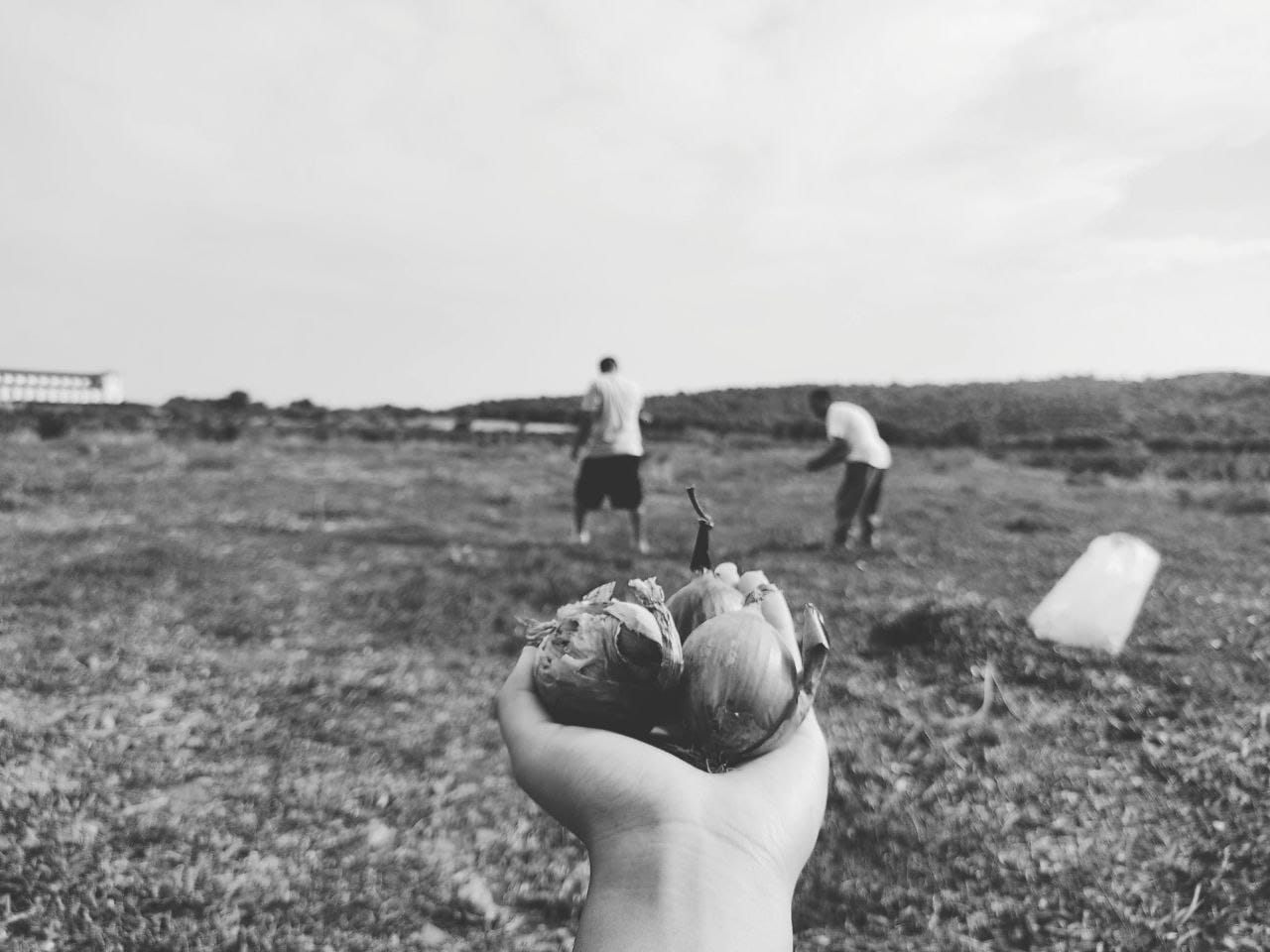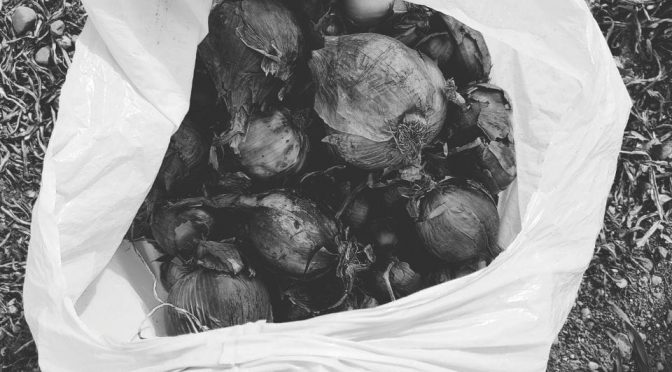My nails soiled with Earth

The sun has not risen yet. I keep one eye close, the other
open to check the clock, hoping I could sleep a bit more.
No, I must get up. I need to pray and quickly get ready,
not to miss the dolmush (small bus).
Walking from the house to the gate of the camp, I can see
some shops opening for the day and I can smell the coffee
brewing in the Kurdish mini coffee shops. As I step out of
the gate onto the road with the wall of the camp behind
me, I join a group of almost 20 people, some with bags on
their backs.
The bus arrives, a white dolmush. Normally it should
transport 12 people, but we all get in, one by one, closer
and closer to each other. With all the seats taken, a
number of us sit on the floor.
There is little light reaching us on the floor. More and
more, we have difficulty to breath, incapable to change
position or stretch our legs. We resign to tolerate it all, as
it will last only for 30 minutes.
Some of the men in the car are almost the age of my
father, some maybe younger. My poor father is sick. He
can’t even walk properly. The same is true for my mother.
Otherwise, I wouldn’t be here, on the floor of this car. I
would be sleeping like so many youths of my age. But the
story and the wave of everyone’s life are different, some
have no waves in their life and some face a tough sea.
A bad smell comes from some shoes. I would really enjoy
making a joke out of our circumstance, but the silence
around me is heavy and scary. Were I to make a joke, I
might be kicked out of the car. The whole scene reminds
me of old, black and white movies.
Finally, a young man, in his late 20s perhaps, changes the
whole situation. I could hear with gratitude his voice
coming from the corner of the car: ‘’Please, use a spray
for your feet. They smell so strongly we can feel the smell
even though you were shoes. Do something, otherwise we
will get all dizzy before starting our work’’.
He is totally right. There is an awful stench in the car. Yet
it is not shocking. Rather, it is totally predictable. The
space is tight, heavy with the breaths of so many people.
Most of them may have not had the time to wash their
face or brush their teeth. Mercifully, it is still early in the
morning and the weather is not yet awfully hot.
Finally, the door opens and we pour out. No chance to
even stretch our body. Our so-called boss is tough and
heartless. “You are not here for gymnastics, start your
work immediately, this field should be finished today.”
He yells at us, screaming out everyone’s mistakes. He is
one of the inhabitants in the camp, but he just knows
some Greeks and, thus, he has become the manager of
the workers. He must be almost 50. His name is Safi, but
now everyone calls him mister Safi Jan.
Such a strange world….
Here in the onions fields, work is divided in 2 stages. I
wish I could work in the second one, but I am new and for
people like me, no matter how old they are, they work only
in this part, harvesting the onions and picking them out of
the ground. At the end of the workday, you can’t see your
nails any more, as if a kilo of soil has gathered under
them. The second stage of the work is better because you
just put the onions in boxes and then lift the filled boxes
onto a truck.
As I gather the onions from the ground, I think of a
chessboard. Yeah, I love this game and I am a good
player. So I enjoy thinking about new techniques and
tactics while picking the onions. It makes time pass faster
and easier.
My very life is itself like a chessboard. Here, however, I
am not the player. Neither the ones who are here working
like me are players on their chessboards. We are all chess
pieces in the hands of politicians, who use our name for
their benefit. It is the same in my country. It seems I have
many rights, but I’m not aware of them. This is the reason
why I and many others like me are exploited.
Generally, I am a calm boy and I don’t interfere with
anything or anyone’s life, unless I have a responsibility to
do so. My quiet manner may well be the main reason why
my brothers, smaller or older, whip me with their words.
They are much fatter than I am and more energetic. I used
to think about everything too much and worry about all
that happens. I feel a heavy weight on my heart and a
heavy weight on my shoulders.
During the first hours of our work, with every minute that
passes, I can feel the heat increasing, reaching up to 36
degrees Celsius. The humidity is very high as well, I feel
as if I stand under a hot shower, or as if someone is
pouring water on me.
Getting close to mid-day, there is no eagerness to have
food, only water, and my clothes are wet through.
Few hours left, I tell myself. I should persevere. I need to
get those 20 euros home. We are getting close to the end
of the week and we were supposed to buy my father’s
medicines at the beginning of each week.
Now, I am counting the moments to see when it will be
14:00 so we can stop working. Exactly as I am thinking
this, Safi says, ‘’Today’s work is finished, thanks to all of
you.’’
This is the best sentence my ears could ever hear.
Going back from here to the camp, however, I feel like a
prisoner who goes from detention to work and to work
from detention. In the Spongebob animation show I saw,
the hero was in jail and working for a coal mine.
I do not even want to think about myself anymore, either
about life, or about the things that happen around me.
Who can see me? Who dares to look at me? I am just a
17 years old boy, who is burying his dreams every day,
trying to accept his realities and somehow continue to live.
Still, this work of ours could be more dignified, better
organized, and equitably paid. We get much less than we
should rightfully get. I know that we are sold from one
boss to another, from an Afghan to a Pakistani and each
of them gets paid for what we do, because they collect us
and bring us to work, but not in an humane way.
The prospect of integration does not rest only in having
the possibility to work on onion fields, or in vineyards or
olive groves. Integration should be based on the
opportunities offered to use our training, our talents, our
skills and abilities in any given field and for us to have a
chance to live as normal citizens in the community.

